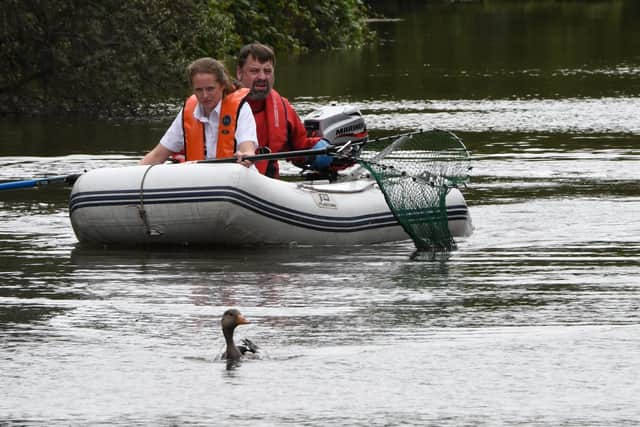Gosling tangled in fishing line on Doncaster lake dies despite RSPCA rescue attempts
and live on Freeview channel 276
Crews took to the water at Highfields Lake in an attempt to rescue the injured bird, but the animal was so badly injured that inspectors took the difficult decision to put it to sleep to end its suffering.
The death came on one of the busiest days for the animal charity, with RSPCA officers also called out to a similar incident at Manvers Lake in Wath just hours later after reports of a bird trapped in angling litter.
Advertisement
Hide AdAdvertisement
Hide AdFortunately, this time the gosling was freed and found to be in good health - so was released back on the water and happily swam away with his family.


Inspector Sara Jordan, who took part in the rescue along with colleagues inspector John Gibson and ARO Kate Hetherington, said both incidents highlighted dangers posed by discarded fishing line.
Sara said: “The RSPCA sadly deals with many animals arriving into its care with terrible injuries caused by angling litter such as discarded fishing line and hooks to plastic netting.
"Positively, the majority of anglers do dispose of their litter properly but it is frustrating that those who don’t possibly don’t realise how dangerous it is to animals.
Advertisement
Hide AdAdvertisement
Hide Ad"Discarded line in particular is a terrible hazard for wildlife, particularly as it can be almost invisible.”
On a difficult day for the RSPCA in Yorkshire, inspectors also dealt with a dead dog found in a suitcase in Sheffield, a cat thrown from a car and a squirrel rescue in Leeds.
The animal charity is giving the public a glimpse of the incredible work of their frontline rescue teams - caring for the animal victims of heartbreaking cruelty.
It comes as the charity launches its Cancel Out Cruelty campaign, to raise funds to help its busy frontline rescue teams continue to save animals from cruelty and abuse and to raise awareness about how to stop cruelty to animals for good.
Advertisement
Hide AdAdvertisement
Hide AdLast Tuesday, the charity received 4,060 calls to its cruelty line - on average six a minute during opening hours - with 1,775 incidents investigated by frontline rescuers.
Tom Buckley, hub manager at the RSPCA’s National Control Centre, based in Wath-on-Dearne, near Barnsley, said: “We take more than a million calls a year but summer is our peak time - with mid July typically being when we receive more calls. The calls we receive are heartbreaking - our dedicated call takers never know what they will hear when they answer the call, but it can range from a report of animals being beaten, shot, abandoned or poisoned.
“Our call handlers know they can make a difference because, working together with frontline rescuers, they can help save lives and coordinate rescues of all types of animals.
“That’s why we need the public's support more than ever to help Cancel Out Cruelty so our call staff and frontline rescuers along with centre and branch staff, can work together to help all those animals in need.”
Advertisement
Hide AdAdvertisement
Hide AdThe RSPCA receives around 91,500 calls to its cruelty line every month and investigates 5,300 reports of deliberate animal cruelty.
But in the peak of summer (during July and August) calls rise to 133,000 a month, and reports of cruelty soar to 8,400 during these months; a heartbreaking 271 every day, or 11 every hour.
In Yorkshire there were 1,520 reports of intentional harm against animals made to the RSPCA last year compared to 1,229 in 2021 - a 23 per cent increase.
Reports are prioritised and tasked out to frontline rescue teams across England and Wales who work tirelessly to help bring animals to safety, and animal abusers to justice.
Advertisement
Hide AdAdvertisement
Hide AdMeanwhile staff and volunteers at RSPCA centres and branches up and down the country are ready to assist in providing any treatment and care the rescued animals may need throughout the day.
While the teams see unimaginable cruelty on the frontline every single day, it’s not all doom and gloom and thanks to the calls to the cruelty line on this day so many animals were saved. Once they are rehabilitated in the RSPCA’s care they will either be returned to the wild or will find the loving homes they deserve.
To help support the RSPCA, visit: www.rspca.org.uk/cruelty